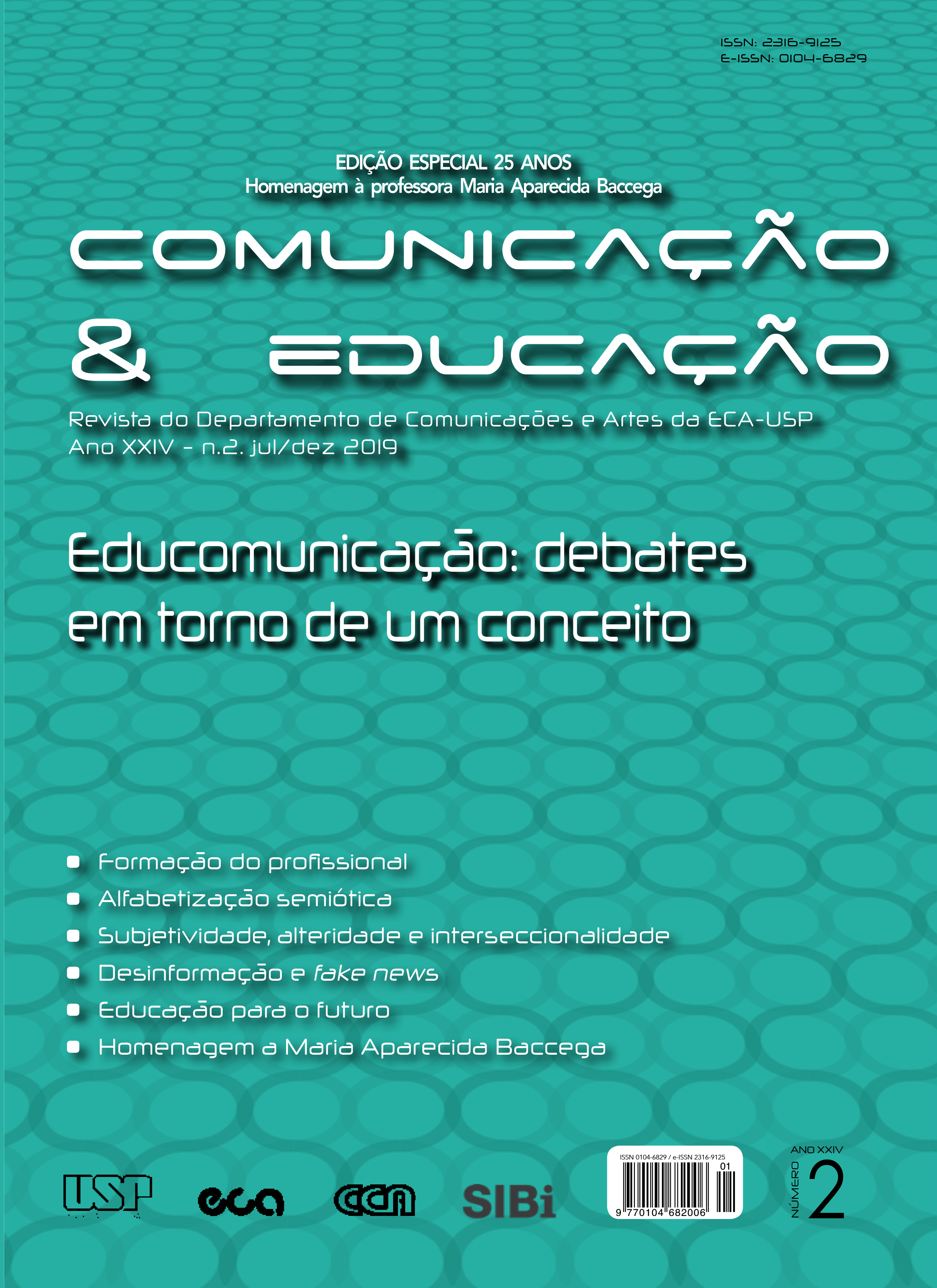Educommunication in the fight against fake news
DOI:
https://doi.org/10.11606/issn.2316-9125.v24i2p66-77Keywords:
disinformation, fake news, big data, educommunication, communication theoriesAbstract
This article addresses two fundamental concepts, educommunication and disinformation, trying to show the manipulation of information and that the influence of communication technologies on public opinion has been a central concern of philosophers and scholars of human communication. Thus, analyzing disinformation as a current phenomenon, the main theories of communication sciences are presented, which provide subsidies to study it – from different but complementary perspectives. From this approach, issues such as democracy, ideology and power become elements that bring these analyses together.
Downloads
References
ALLCOTT, Hunt; GENTZKOW, Matthew. Social media and fake news in the 2016 election. Journal of Economic Perspectives, Nashville, v. 31, n. 2, p. 211-236, 2017. Disponível em: https://doi.org/10.1257/jep.31.2.211. Acesso em: 2 jan. 2020.
ART of the lie. The Economist, London, 10 set. 2016. Disponível em: https://www.economist.com/leaders/2016/09/10/art-of-the-lie. Acesso em: 12 jul. 2019.
BAKHTIN, Mikhail. Marxismo e filosofia da linguagem: problemas fundamentais do método sociológico na ciência da linguagem. 7. ed. São Paulo: Hucitec, 1993.
BAUDRILLARD, Jean. Simulacros e simulação. Lisboa: Antropos, 1991.
BENJAMIN, Walter. Escritos sobre mito e linguagem. São Paulo: Duas Cidades: Editora 34, 2011.
BOURDIEU, Pierre. A economia das trocas linguísticas: o que falar quer dizer. São Paulo: Edusp, 1996.
BOYD, danah; CRAWFORD, Kate. Critical questions for big data: provocations for a cultural, technological, and scholarly phenomenon. Information, Communication & Society, Abingdon, v. 15, n. 5, p. 662-679, 2012. Disponível em: https://people.cs.kuleuven.be/~bettina.berendt/teaching/ViennaDH15/boyd_crawford_2012.pdf. Acesso em: 24 out. 2019.
BRADY, William J.; WILLS, Julian A.; JOSTA, John T.; TUCKER, Joshua A.; VAN BAVEL, Jay J. Emotion shapes the diffusion of moralized content in social networks. Proceedings of the National Academy of Sciences, Washington, DC, v. 114, n. 28, p. 7313-7318, 2017. Disponível em: https://doi.org/10.1073/pnas.1618923114. Acesso em: 2 jan. 2020.
CHESNEY, Robert; CITRON, Danielle Keats. Deep fakes: a looming challenge for privacy, democracy, and national security. SSRN Electronic Journal, Amsterdam, 21 jul. 2018. Disponível em: https://dx.doi.org/10.2139/ssrn.3213954. Acesso em: 3 jan. 2020.
COMISSÃO EUROPEIA. Comunicação da Comissão ao Parlamento Europeu, ao Conselho, ao Comitê Econômico e Social Europeu e ao Comitê das Regiões: combater a desinformação em linha: uma estratégia europeia. Bruxelas: Comissão Europeia, 2018. Disponível em: https://eur-lex.europa.eu/legal-content/PT/TXT/PDF/?uri=CELEX:52018DC0236&qid=1525280608825&from=EN. Acesso em: 16 mar. 2019.
DEBORD, Guy. A sociedade do espetáculo. Lisboa: Edições Afrodite, 1972.
FAKE news impactam a eleição e têm que ser combatidas. Agência Lupa, Brasília, DF, 22 out. 2018. Disponível em: https://piaui.folha.uol.com.br/lupa/wp-content/uploads/2018/10/Propostas-checadores-TS.pdf. Acesso em: 3 jan. 2020.
GIESEA, Jeff. It’s time to embrace memetic warfare. Defense Strategic Communications, Riga, v. 1, n. 1, p. 67-76, 2015.
ISAAC, Mike; WAKABAYASHI, Daisuke. Russian influence reached 126 million through Facebook alone. The New York Times, New York, 30 out. 2017. Disponível em: https://www.nytimes.com/2017/10/30/technology/facebook-google-russia.html. Acesso em: 31 ago. 2019.
JUST, Natascha; LATZER, Michael. Governance by algorithms: reality construction by algorithmic selection on the internet. Media, Culture & Society, Thousand Oaks, v. 39, n. 2, p. 238-258, 2016. Disponível em: https://doi.org/10.1177/0163443716643157. Acesso em: 3 jan. 2020.
KITCHIN, Rob. Big data, new epistemologies and paradigm shifts. Big Data & Society, Thousand Oaks, p. 1-12, 1 abr. 2014. Disponível em: https://doi.org/10.1177/2053951714528481. Acesso em: 3 jan. 2020.
LEWIS, Paul; HILDER, Paul. Leaked: Cambridge Analytica’s blueprint for Trump victory. The Guardian, London, 23 mar. 2018. Disponível em: https://www.theguardian.com/uk-news/2018/mar/23/leaked-cambridge-analyticas-blueprint-for-trump-victory. Acesso em: 31 ago. 2019.
LIBÓRIO, Bárbara; CUNHA, Ana Rita. Notícias falsas foram compartilhadas ao menos 3,84 milhões de vezes durante as eleições. Aos Fatos, Rio de Janeiro, 31 out. 2018. Disponível em: https://aosfatos.org/noticias/noticias-falsas-foram-compartilhadas-ao-menos-384-milhoes-vezes-durante-eleicoes/. Acesso em: 3 jan. 2020.
LIPPMANN, Walter. Opinião pública. Petrópolis: Vozes, 2008.
LOHR, Steve. Data-ism: the revolution transforming decision making, consumer behavior, and almost everything else. New York: Harper Business, 2015.
MARTÍN-BARBERO, Jesús. A comunicação na educação. São Paulo: Contexto, 2014.
MARX, Karl. O capital: crítica da economia política: livro 1: o processo de produção capitalista. 2. ed. Rio de Janeiro: Civilização Brasileira, 1971. v. 1.
MARX, Karl. A ideologia alemã. São Paulo: Martins Fontes, 2002.
MOROZOV, Evgeny. Big tech: a ascensão dos dados e a morte da política. São Paulo: Ubu, 2018.
PARISER, Eli. The filter bubble: what the internet is hiding from you. New York: The Penguin Press, 2011.
PEARL, Judea; MACKENZIE, Dana. The book of why. New York: Basic Books, 2018.
PLATÃO. A República. Rio de Janeiro: Best Seller: 2002.
ROSENBERG, Matthew; CONFESSORE, Nicholas; CADWALLADR, Carole. How Trump consultants exploited the Facebook data of millions. The New York Times, New York, 17 mar. 2018. Disponível em: https://www.nytimes.com/2018/03/17/us/politics/cambridge-analytica-trump-campaign.html. Acesso em: 19 ago. 2019.
SEARLE, John. Expressão e significado. São Paulo: Martins Fontes, 1955.
TIMBERG, Craig. Russian propaganda may have been shared hundreds of millions of times, new research says. The Washington Post, Washington, DC, 5 out. 2017. Disponível em: https://www.washingtonpost.com/news/the-switch/wp/2017/10/05/russian-propaganda-may-have-been-shared-hundreds-of-millions-of-times-new-research-says/. Acesso em: 3 jan. 2020.
VAN DIJCK, José. Datafication, dataism and dataveillance: big data between scientific paradigm and ideology. Surveillance & Society, Chapel Hill, v. 12, n. 2, p. 197-208, 2014. Disponível em: https://doi.org/10.24908/ss.v12i2.4776. Acesso em: 3 jan. 2020.
WORD of the year 2016. Oxford Languages, Oxford, 8 nov. 2016. Disponível em: https://languages.oup.com/word-of-the-year/2016/. Acesso em: 3 jan. 2020.
Downloads
Published
Issue
Section
License
I authorize the publication of the submitted article and soon the copyrights to the magazine, in the printed and electronic version, if it is approved after the evaluation of the reviewers.
I understand that readers may use this article without prior request, provided the source and authorship are mentioned. Readers are not authorized to use this article for reproduction, in whole or in part, for commercial purposes.

































